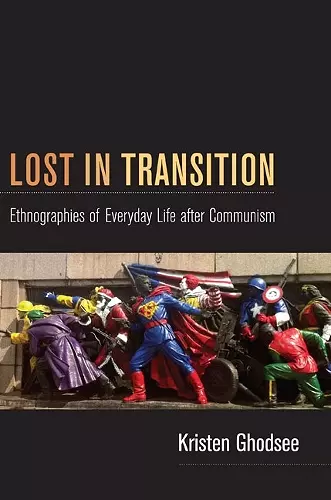Lost in Transition
Ethnographies of Everyday Life after Communism
Format:Hardback
Publisher:Duke University Press
Published:14th Sep '11
Currently unavailable, and unfortunately no date known when it will be back

Through ethnographic essays and short stories based on her experiences in Eastern Europe between 1989 and 2009, Kristen Ghodsee explains why many Eastern Europeans are nostalgic for the communist past
Lost in Transition tells of ordinary lives upended by the collapse of communism. Through ethnographic essays and short stories based on her experiences with Eastern Europe between 1989 and 2009, Kristen Ghodsee explains why it is that so many Eastern Europeans are nostalgic for the communist past. Ghodsee uses Bulgaria, the Eastern European nation where she has spent the most time, as a lens for exploring the broader transition from communism to democracy. She locates the growing nostalgia for the communist era in the disastrous, disorienting way that the transition was handled. The privatization process was contested and chaotic. A few well-connected foreigners and a new local class of oligarchs and criminals used the uncertainty of the transition process to take formerly state-owned assets for themselves. Ordinary people inevitably felt that they had been robbed. Many people lost their jobs just as the state social-support system disappeared. Lost in Transition portrays one of the most dramatic upheavals in modern history by describing the ways that it interrupted the rhythms of everyday lives, leaving confusion, frustration, and insecurity in its wake.
“The collapse of the Soviet empire entailed not only the blitzkrieg dissolution of the socialist economies and one-party states of Eastern Europe but also immediate accidental and incidental changes in the everyday lives of its residents. With an ear for the ironic, the sensual, the playful, and the tragic, Kristen Ghodsee tells personal stories from this period of dissolution, which began several decades before the Berlin Wall came down. Drawing from her encounters during many years of research in Bulgaria, she portrays the changing nature of experience in that place during that time. Though understood as impoverished at the time, this socialist experiment reveals, in retrospect, lives filled with adventure, surprising friendships, and an openness to forms of engagement and being that makes the fullness of the free market and democracy in the post–Cold War order of today seem, by comparison, pale and predictable.”—John Borneman, Princeton University
“These charming essays have an unintended consequence. Not only are they a documentary ethnography of the lives of people caught up in the painful transition from socialism to capitalism. They are also a sort of bildungsroman of a young American discovering another world and shedding stereotypes.”—Maria Todorova, University of Illinois, Urbana-Champaign
“[A] captivating collection of ethnographic essays and short stories about real people and fictional characters whose daily lives were turned upside down after the collapse of communism. . . . There is nothing careless or self-indulgent about Ghodsee’s writing. Her probing inquisitiveness, together with her astute thoughts and vivid observations, breathe life into each and every character in the book, from ketchup smugglers and flashy mobsters to shrewd entrepreneurs and irate shepherds, and bring the reader closer to everyday life after communism.” -- Vasiliki P. Neofotistos * American Ethnologist *
“Without having lived through it first hand, it is hard to grasp the magnitude of the change to daily life in the Eastern Bloc after the collapse of the region's Communist regimes in the late 20th century. Not only was this a time of fundamental system change in the higher echelons of government, it was also a significant juncture in the lives and prospects of ordinary people. And, contrary to Western assumptions about the inherent superiority of democracy, for many the transition has been extremely challenging. In this accessible book, ethnographer Kristen Ghodsee turns her attention to the human costs of the passing of Communism in Bulgaria.” -- Hester Vaizey * Times Higher Education *
“Lost in Transition tells stories about how the lives of ordinary people changed after the fall of the Soviet Union. The author… navigates the task of producing a balanced account of the transition from communism to capitalism with skill…. The continuation of this project will surely enrich the body of literature on the subject.” -- Sahar Razavi * International Feminist Journal of Politics *
“Ghodsee’s stories beautifully demonstrate how nostalgic sentiments do not mean a return to the past but are part of a coping mechanism during hard times. . . . I would highly recommend the book in various classrooms to introduce the intimate experiences of Cold War, communism, and post-communism, as well as to broaden the understanding of modern Europe, and theworld which continues the legacies of the Cold War. Courses on ethnographic methods as well as ethnographies of post-socialism will also find use in these compelling stories and experimental writings.” -- Yuson Jung * Anthropological Quarterly *
ISBN: 9780822350897
Dimensions: unknown
Weight: 367g
232 pages